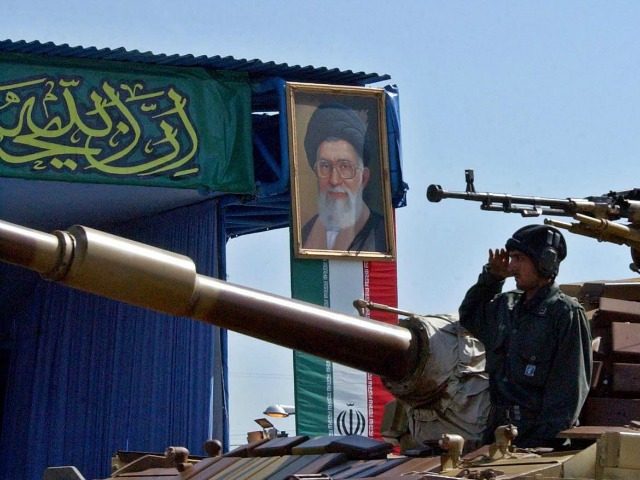Tehran has reportedly deployed dozens of artillery-backed tanks and its powerful Islamic Revolutionary Guards Corps (IRGC) to link up with Iran-allied Shiite militias at the Iraqi Kurdistan border in response to the Kurds overwhelmingly voting in favor of independence from Iraq last Monday.
Northern Iraq’s autonomous Kurdistan Regional Government (KRG) has refused to be coerced by the Iraqi government and neighboring countries into relinquishing control of its international crossings and airports to Baghdad.
Shiite-led Baghdad, a close ally of Tehran, has vowed to seize authority over the borders and airports of its Kurdish region with the help of neighboring Iran and Turkey.
Iraq has also deployed troops to the Turkish side of the Turkey-KRG border to carry out military drills.
Late last week, Reuters learned from the Baghdad-based defense ministry that Iraq is planning to wrest control of the KRG’s borders “in coordination” with Iran and Turkey as part of retaliatory measures following the independence referendum.
Reuters now reports that Iranian state television on Saturday quoted an unnamed Islamic Republic military spokesman as saying that Iran and Iraq “agreed on measures to establish border security and receive Iraqi forces that are to be stationed at border posts.”
Nevertheless, Iran- and Turkey-backed attempts by Baghdad to coerce the KRG into canceling the outcome of the referendum by threatening to impose sanctions, international isolation, and even a military intervention if it fails to do so, appear to have failed so far.
KRG President Masoud Barzani has stressed that Iraqi Kurdistan “plans to use the referendum’s result as a mandate to negotiate the peaceful secession of the Kurdish region through talks with Baghdad,” reports Reuters.
As shown by its Iran and Turkey-supported threats, the Iraqi government “has rejected any talks with the KRG over independence,” demanding that the KRG hand over control of its external border crossings with Iran, Turkey, and Syria, as well as its airports to Baghdad.
Despite objections from Baghdad and the United States, Iraqi Kurds voted “yes” to independence last Monday.
The neighboring countries, including Syria, are opposed to an independent Iraqi Kurdistan, fearing that the move will fuel separatism among their Kurdish population.
Speaking on condition of anonymity, a KRG official told Reuters on Monday that Tehran had sent “a dozen tanks supported by artillery” to the Parviz Khan border crossing that separates Iraqi Kurdistan from Iran.
The Kurdish official reportedly indicated that the move was a “dangerous escalation” in the crisis sparked by the Iraqi Kurds’ vote in favor of independence.
According to Kurdish news outlet Rudaw, Iran’s elite IRGC troops and Iraq’s Popular Mobilization Forces (PMF/PMU), or Hashd al-Shaabi—a Baghdad-sponsored umbrella organization of mostly Tehran-allied Shiite militias—are participating in the military exercise.
In the days leading to the independence vote and after, simmering tensions have intensified between predominantly Sunni Kurdish Peshmerga fighters and the Shiite PMU troops in disputed territory claimed by Baghdad and the KRG.
Citing Iran’s state-controlled Mehr News Agency (MNA), Reuters points out that Tehran confirmed its deployment of military resources to the Islamic Republic’s Parviz Khan border crossing with the KRG.
Iran has reportedly acknowledged that the move was part of joint military drills carried out by the Iranian and Iraqi armies in response to the independence vote, noting that the exercises began last Sunday.
“We have always respected our borders with our neighbors, and any [military] move will be in coordination with Baghdad and our allies,” an unnamed senior official from Iran, which maintains a significant level of influence over Shiite-led Baghdad, told Reuters.
Last week, the U.S.-backed Iraqi military announced that it was planning “to coordinate military efforts” with neighboring Iran, which the American government has officially designated the world’s leading state-sponsor of terrorism.
During a meeting Saturday, Saed Masud Jazayeri, the deputy chief of the Iranian military, indicated that Tehran discussed assisting Baghdad “impose its control” over territory along Iran’s border areas with Iraqi Kurdistan, notes Rudaw.
All three countries—Iran, Iraq, and Turkey — are working together against Iraqi Kurdistan.
“Iran and Turkey share the same stance on the referendum in Iraqi Kurdistan, and both insist on the sovereignty of Iraq,” the state-controlled Islamic Republic News Agency (IRNA) quotes Iranian Gen. Mohammad Baqeri as saying after meeting with Turkish Chief of Staff Hulusi Akar in Tehran on Monday, notes Reuters.
“The armed forces of both countries will increase cooperation in training and war games,” he also said, adds Reuters, citing Iran’s semi-official Tasnim News Agency.
The United States has cautioned against the unilateral use of force by Iraq or its neighbors.
“We call upon the central government to reject threats or even allusion to the possible use of force. The United States asks all parties, including Iraq’s neighbors, to reject unilateral actions and the use of force,” declared U.S. Secretary of State Rex Tillerson while maintaining America’s opposition to the Kurdish independence vote.

COMMENTS
Please let us know if you're having issues with commenting.